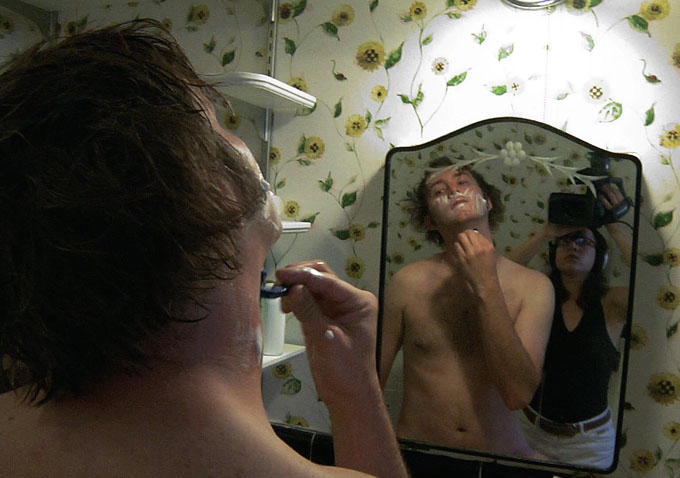 In France in 1961, Jean Rouch and Edgar Morin directed a film (“Chronicle of a Summer”) in which they interviewed a group of diverse Parisians about whether or not they were happy, in a series of man on the street interviews, boozy dinner parties, and casual conversations, with the directors themselves onscreen as moderators of sorts. They then screened the footage for their group of subjects, and watched the fur fly as these people were forced to confront themselves and their peers onscreen. This film would go on to change documentary form and launch the cinéma vérité filmmaking movement. The title of “cinéma vérité” is often incorrectly used to describe observational, fly-on-the-wall style filmmaking, which should actually be called Direct Cinema (e.g. the Maysles Brothers, Frederick Wiseman). Cinéma vérité refers to the practice of the filmmaker engaging or provoking their subjects in conversation/scenarios that allow the filmmaking process to be apparent or even part of the film itself, often through the subject watching themselves onscreen (this is a technique used to great effect in Joshua Oppenheimer‘s “The Act of Killing“). The idea is that addressing the fact of the filmmaking process is the only way to achieve real “cinema truth.” Director Joanna Arnow draws on this tradition for her debut documentary feature “i hate myself 🙂” but also trains the camera even more intensely and intimately on herself as both a filmmaker and subject within this work.
In France in 1961, Jean Rouch and Edgar Morin directed a film (“Chronicle of a Summer”) in which they interviewed a group of diverse Parisians about whether or not they were happy, in a series of man on the street interviews, boozy dinner parties, and casual conversations, with the directors themselves onscreen as moderators of sorts. They then screened the footage for their group of subjects, and watched the fur fly as these people were forced to confront themselves and their peers onscreen. This film would go on to change documentary form and launch the cinéma vérité filmmaking movement. The title of “cinéma vérité” is often incorrectly used to describe observational, fly-on-the-wall style filmmaking, which should actually be called Direct Cinema (e.g. the Maysles Brothers, Frederick Wiseman). Cinéma vérité refers to the practice of the filmmaker engaging or provoking their subjects in conversation/scenarios that allow the filmmaking process to be apparent or even part of the film itself, often through the subject watching themselves onscreen (this is a technique used to great effect in Joshua Oppenheimer‘s “The Act of Killing“). The idea is that addressing the fact of the filmmaking process is the only way to achieve real “cinema truth.” Director Joanna Arnow draws on this tradition for her debut documentary feature “i hate myself 🙂” but also trains the camera even more intensely and intimately on herself as both a filmmaker and subject within this work.
The premise of the film, as she attempts to describe to her parents in the opening sequence is: “Is James a good person to be dating?” The answer quickly becomes readily apparent: no, no he is not. An often sweet but wildly volatile poet/performer, James hosts a ramshackle open mic night at a juice bar in his Harlem neighborhood, where his poems often devolve into racially charged drunken rants. He attempts to justify his use of racial slurs by claiming freedom of speech, but only succeeds in squandering the goodwill of the majority black community that has embraced him. It’s clear there’s a magnetism about him, as Joanna and others are drawn to his high-energy, taboo-courting brand of expression, though as an audience member, watching James is fairly painful and not in that mesmerizing trainwreck way either.
Thankfully, Joanna (with the guidance of her naked editor, Max) quickly veers the film away from James’ drunken antics and back toward the film itself, turning its gaze inward toward the filmmaking process while she attempts to break up with James. Joanna herself and her drive to finish this film proves to be the most interesting subject, as she opens up about why she keeps going back and why she dated him in the first place. Her relationship with her parents and their reluctance to participate in the film is also an integral part of this, and she continues to push them, her insistence on the camera’s lens a torment for her family and boyfriend but also an unveiling of how this process works. The film becomes the text of the film itself, no longer about dating or James or her parents but about what is driving her.
Arnow’s intimate and unvarnished gaze upon herself, her sex life and the state of modern dating in Brooklyn calls to mind Lena Dunham‘s work. Both women are “brave” in their willingness to expose themselves and any flaws or mistakes or foibles they might have. But while Dunham presents a thinly veiled representation of her life in “Girls” or “Tiny Furniture,” toying with reality and fiction, but always behind a fictional account of reality, Arnow sheds any trappings of fiction, presenting herself, her filmmaking, her relationships and her sex life in an at times shockingly frank manner. It’s refreshing to see a filmmaker embrace this honesty with such gusto (which, like life, is often painful or awkward to experience).
At the end of the film, the premise is no longer “is James a good person to be dating?” Ultimately, James is not the most important part of this film, though he appears often. It’s how Joanna interacts with James, how she does or does not listen to her rational (and naked) editor, how she pleads with and pushes her parents to see her as she is now, a woman, a woman who has sex. This assertion of self, a sexual self, a creative self, an autonomous self (a self that has taken its form in this film) is the real premise and the real message. A feminist one, in ways, yes, but ultimately a personal one. [B+]

